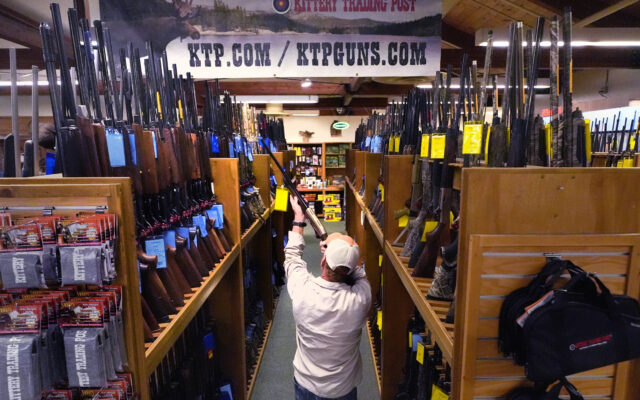
Maine hunters hope to see 72-hour gun purchase waiting period repealed
By Julie Harris, Bangor Daily News Staff
The gun rights group that filed a lawsuit challenging the constitutionality of the Maine law requiring a 72-hour waiting period after purchasing a gun hopes the case makes it all the way to the U.S. Supreme Court.
If it does, it could set a new precedent for a conservative-leaning court that in the past has allowed restrictive gun laws to stand, said David Trahan, executive director of Sportsman’s Alliance of Maine.
The lawsuit was filed Nov. 12 by Sportsman’s Alliance of Maine and Gun Owners of Maine, citing a violation of the 2nd Amendment.
In a state that broadly favors gun rights but is still reeling from a mass shooting that left 18 people dead and 13 injured, gun rights and gun safety advocates are in a balancing act of preventing further acts of violence without violating people’s constitutional rights. But Maine hunters — including one who was injured in the Lewiston mass shooting — said they hope to see the state’s latest gun law repealed.
Gov. Janet Mills allowed the waiting period law to go into effect in August without her signature. It requires gun buyers to wait 72 hours before taking their purchases home, and was passed after the mass shooting in Lewiston in October 2023.
The state of Maine and Attorney General Aaron Frey will file a response to the lawsuit and the request for a judge to pause the law until the case wraps up. A hearing on the preliminary injunction request will likely be held in the coming months. Either side can appeal that decision to the U.S. First Circuit Court of Appeals in Boston.
If the injunction decision is not appealed, the case in Bangor will proceed before Judge Lance Walker in U.S. District Court. The lawsuit is not seeking a jury trial, so Walker will likely issue a decision based on the legal arguments presented by Frey and the plaintiffs.
That decision can be appealed to the appeals court in Boston, where judges will choose if they want to take up the case. If they do, a panel of three judges will issue a decision on the legality of the law. After that opinion, either side can appeal it to the Supreme Court of the United States.
The country’s highest court will decide if it wants to hear the case. If it declines, the opinion of the appeals court will stand. If the Supreme Court hears the case, it will likely issue an opinion on legality of the 72-hour waiting period.
While gun rights and gun safety advocates battle out the constitutionality of the 72-hour law in the court system, Maine hunters hope that the waiting period will be repealed. Among them is Ben Dyer, who survived being shot five times during the Lewiston shooting.
He lost the use of his right arm due to his injuries and had to purchase left-handed firearms so he could hunt this fall. He had to go through the 72-hour process when he bought two guns on Oct. 1.
Instead of the 72-hour waiting period, Dyer favored the red flag law, saying it would stop people like Robert Card II because family members can direct police to remove a person’s guns if they pose a threat to themselves or others.
“It would have made it harder for Card to do what he did,” Dyer said of a red flag law.
Ron Greco, a hunter and the founder and executive director of Moose Maine Kids, a nonprofit organization that takes kids with critical illnesses or disabilities on outdoor adventures, believes there are loopholes in the 72-hour law and that it won’t stand up in Maine courts. His work at Moose Maine Kids includes guided hunts for the kids.
He said the real problem is the lack of enforcement of the gun laws already in place.
Nacole Palmer, executive director of the Maine Gun Safety Coalition, maintains that the 72-hour law is constitutional, and will stand up to the legal challenge. The Supreme Court has turned away other challenges, including one in California in which gun rights advocates wanted to overturn a 10-day waiting period.
As for the battleground of future laws, gun rights and gun safety advocates agree that it will be at the state level, not in Washington.
“Nothing will pass the president’s desk that will scare people about their gun rights,” Trahan said.
Almost no progress on reasonable gun laws has been made at the federal level in the past 30 years, said Palmer. The one exception was the bipartisan Safer Communities Act, which President-elect Donald Trump has promised to repeal when he gets in office.
The Safer Communities Act primarily provided resources to communities to help them prevent gun violence, address mental health issues and make schools safer.
Based on Trump’s previous term in office, it’s even more important that Maine pursue its own safe gun legislation, she said.
“We are full steam ahead and making sure some common sense gun laws are passed in Maine,” Palmer said. “Gun violence is preventable. We know what it takes. We need gun safety laws that are also constitutional, and that’s what we are moving forward on.”
The coalition is still working on legislation for the upcoming session, but is already gathering signatures to get an extreme risk protection order referendum onto a ballot for Mainers to decide.
It would be an additional tool to the state’s yellow flag law that allows police to temporarily take guns away from a person who is showing signs of being a danger to themself or others, Palmer said.
BDN writer Marie Weidmayer contributed to this report.